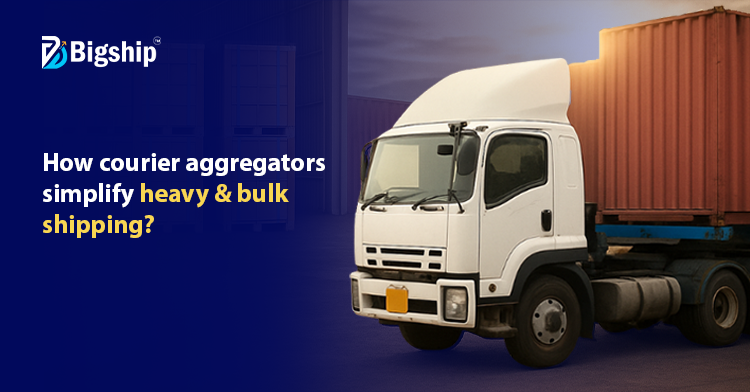In today’s fast-moving B2B market, which is very dynamic, companies are constantly giving and receiving heavy and bulk shipments. Manufacturers are sending machines to distributors, shipping large quantities across the country. They are all connected through the chain of logistics.
Most of the companies in the past often made use of one courier company or transport partner for all their deliveries. But this method frequently causes issues such as limited reach, fixed rates, delayed deliveries, and lack of flexibility during high demand periods.

However, the courier aggregators have come out as a smarter and more efficient option in the present scenario. They are uniting many couriers and transport companies on one platform and providing businesses with more power, better prices, and smoother operation.
Let’s discuss in this blog about why businesses are picking aggregators for bulk shipments.
What is a Courier Aggregator in B2B Logistics?
A courier aggregator is a bridge that connects organisations and various couriers and logistics firms in one location. It enables companies to get the complete network of partners with different specialities, costs, and areas, rather than just one courier company.
Besides that, an aggregator doesn’t own trucks or warehouses just like a single logistics firm or a transport company. Rather it functions as a tech-based mediator where the courier is selected for each shipment based on cost, time of delivery, or type of service.
What’s the biggest plus? The multi-carrier advantage, which gives you the reach and reliability of sever all couriers at the same time without the hassle of managing them all separately.
Why Businesses Prefer Courier Aggregators for Bulk Shipments?
1. Flexible Carrier Selection
With a courier aggregator, you can choose the best carrier for every shipment type, whether it’s a heavy industrial consignment, a palletized load, or goods for tier-3 cities. All this happens from one centralized dashboard, where you can view rates, delivery times, and service quality from multiple couriers before making a choice.
2. Better Pricing Through Volume-Based Discounts
Aggregators ship millions of parcels each month for multiple clients. This bulk volume gives them stronger negotiating power with courier partners. As a result, they can offer discounted rates to businesses, much lower than what you’d get by directly approaching one courier. This helps you cut per-shipment costs and improve profit margins, especially when dealing with high-volume or heavy shipments.
3. Higher Service Reliability
Relying on a single courier can be risky. If they’re overloaded or face delays, your entire supply chain gets affected. With an aggregator, you always have backup carriers ready. If one courier is slow or unavailable for a route, the system can auto-switch to another, ensuring continuous delivery performance and better reliability for your customers.
4. Pan-India Reach with Special Routes
Courier aggregators connect you with both national and regional players, offering pan-India coverage from metro cities to the most remote pin codes. They also identify special routes, like industrial zones or hilly regions, where certain couriers perform better. This helps ensure every shipment reaches its destination without compromise.
5. Simplified Operations & Single Dashboard
Managing multiple couriers manually can become messy with different tracking links, invoices, and labels. However, an aggregator simplifies everything with one unified dashboard where you can handle:
- Order booking
- Label generation
- Shipment tracking
- Billing and finance reports
This not only saves time but also keeps your logistics data organized and transparent.
6. Proactive Support & Priority Assistance
Instead of waiting in long queues or sending multiple support emails, businesses using courier aggregators enjoy dedicated account management. Your account manager helps with issue resolution, escalations, and performance tracking, thus making support faster and more personalized.
Which Businesses Gain the Most?
Courier aggregators are a major source of profitability for the businesses that ship goods in bulk or on a regular basis. By providing a great variety of couriers, flexible pricing, and good delivery areas, they make logistics easier for different sectors. Here are some ways different industries can benefit from courier aggregators:
1. Manufacturers & Distributors
Manufacturers usually send huge amounts of raw materials or finished goods to dealers and retailers all over the country. With a courier aggregator, they can:
1. Select proper carriers for heavy or long-distance deliveries.
2. Monitor all shipments in one location.
3. Secure better rates through bulk discounts.
2. D2C Brands and E-commerce Sellers
D2C brands often send a large amount of their products to warehouses, marketplaces, or distribution centers. A courier aggregator allows them to:
1. Analyse courier prices and delivery schedules.
2. Control the shipment of goods to customers and the return shipment easily.
3. Get updates about their goods and access to consolidated reports.
3. Suppliers of Heavy Machinery and Industrial Equipment
Such firms deal only with oversized, heavy, or high-value goods. Aggregators provide them with:
1. Specialised carriers for heavy freight.
2. Flexible transport such as surface or express delivery.
3. Support for insurance for claims or delays
4. Furniture and Home Decor Manufacturers
Big and fragile items such as furniture or lighting need special handling. Aggregators play a part in the delivery of these products by:
1. Linking them to couriers that are good in handling bulky shipments.
2. Facilitating full visibility at each stage and optimizing the route.
3. Minimizing the risk of damage by matching the shipment with a more suitable courier.
5. Pharma & Healthcare Suppliers
Pharma companies frequently transport consignments that rely heavily on time or temperature. Courier aggregators make it possible to achieve:
1. Express delivery options for critical medical supplies.
2. Transparency through real-time tracking.
3. Carrier backups to prevent delays.
Cost & Efficiency Benefits (with quick comparison)
| Criterion | Single Courier | Courier Aggregator |
| Rates | Fixed / High | Negotiated / Lower |
| Reach | Limited | Multi-network |
| Risk of delay | High | Switched dynamically |
| Support | Ticket-based | Priority assistance |
Case Study: How Greynite Nutrition Scaled Faster with Bigship?
As the brand expands, its logistics management across locations becomes complex. Similarly, one of our clients, Kaveer Singh, the founder of Greynite Nutrition, a fast-rising supplement brand with branches in Dehradun and Delhi faced some major issues when it came to shipping.
Problems such as delayed shipments, inconsistent tracking and limited courier options were among the main ones that caused them to struggle. The logistics department had to work manually, which took hours every day and affected the overall efficiency of the company.
But Bigship was a real game changer for Greynite. They had their manual work cut down owing to the one platform providing access to all the couriers and the processes being automated. As a result, their order turnaround time improved and customer satisfaction was raised to a whole new level.
Experience-
“Bigship has been a game-changer for us. The automation, courier choices, and support system have made our shipping process effortless. We now deliver faster, spend less, and focus more on growing our brand.” — Kaveer Singh, Founder, Greynite Nutrition
Key Features to Look for in a Good Courier Aggregator
When you are looking for a courier aggregator, consider the factors mentioned below:
1. Wide Carrier Network
The best aggregator should bring you together with multiple courier partners which include national carriers and regional ones as well. This not only guarantees wider coverage in both metros and remote areas but also allows you to select suitable courier for different shipments based on their requirements.
2. Bulk Shipment Handling & Freight Optimization
In the case of companies that are dealing with large volumes of shipments, the aggregator supports with the booking of bulk shipments and optimization of freight. The system recommends the best carrier and route according to weight, distance, and delivery time — thus, cutting down on costs and improving efficiency.
3. Insurance & Claim Support
An aggregator that features easy claims support in the event of shipment loss or damage plus insurance options for high-value shipments should be selected. Quick claim processing and transparent policies are business features that add both security and peace of mind for your business.
4. Real-Time Tracking
A trustworthy aggregator provides the possibility of real-time shipment tracking across all carriers. You should be able to follow each shipment from one interface, receive live reports and be informed in case of delays or other exceptions. This benefits visibility and communication with the customers.
5. Dedicated Account Manager & Priority Support
Support that is tailored specifically to the client’s needs is very important in logistics. The top aggregators will have a dedicated account manager who helps with the issues, escalations, and service improvements, thereby ensuring quick resolution and smooth coordination.
Conclusion
In the fast-evolving logistics and delivery landscape, courier aggregators have become a crucial bridge between companies and various delivery partners. They provide a smarter, tech-driven alternative to the traditional logistics methods for companies that transport heavy or bulk shipments, embracing flexibility, cost efficiency, and scalability all at one place.
The adoption of various carriers, real-time tracking, and discounts based on the amount shipped are some of the advantages that courier aggregators offer to businesses to ensure smooth operations and more reliable deliveries. No matter if you are a manufacturer, distributor, or retailer, the use of a courier aggregator can not only make your operations easier but also open the door to a larger audience and provide uniform service quality, all at the same time keeping the logistics cost under control.





